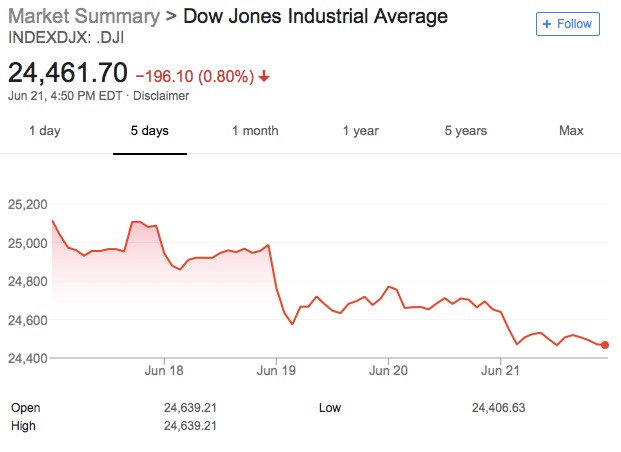Legendary investors aren’t worried at all about the seething U.S.-China trade war, while Goldman Sachs warns that the same is likely to drag the Dow further down the losing-streak rabbit hole. The two advising camps are about as disparate as Washington and Beijing themselves, but it depends who’s listening.
Legendary investors such as Warren Buffett and Paul Tudor Jones have built their massive billions on not being afraid of riding out storms in the shelter of a very fine-tuned form of patience.
They’re billionaires because they see the big picture, and it’s long-term.
The Dow, by contrast, is jolted by tweets and headlines, fed by the fear of the day, and even of the moment.
So both are right—or wrong--depending on what kind of a relationship you have with space and time.
Trade war tensions have been escalating, on-and-off, for months. Every tweet from Trump slaps the Dow on the wrist, and a temporarily silence for a day brings headlines along the lines of “Markets Climb as Trade War Fears Ease”. The unpredictability itself has almost become predictable.
Buffett isn’t known for making stock decisions on headlines. So, even as Trump brings the trade war to a fever pitch, and China responds in kind, he isn’t blinking. The legends see this as long negotiation that will eventually reach a satisfactory conclusion.
Last month, speaking at the Berkshire annual shareholder meeting Warren Buffett said he was optimistic the two countries will avoid a serious trade conflict because countries eventually do what it is in their best economic interest.
“The United States and China are going to be the two super-powers of the world, economically… we will have disagreements but the benefits are huge and the world is dependent on it in a major way for its progress.”
Of course, Berkshire has hefty interests in China, including a massive stake in the Chinese car company BYD, not to mention Apple, Coca-Cola and GM all of whom have a strong presence in China. Related: Tech Unicorns Are Taking Over European Stock Markets
Tudor Jones agrees, and says we’re missing the bigger picture here. Nor does he agree that there is any real reason for a trade war from the U.S. perspective.
“A weighted average tariff imposed by the four largest trading partners on U.S. exports is 6 percent, while the average tariff on imported goods to the U.S. from the same countries is just 3.5 percent, he told CNBC. “While a 2.5-percent ‘unfairness’ gap exists, it would amount to a $40-to-$50-billion ‘problem’ in an $87-trillion global economy if it were quantified,” Jones said. "I would call it more of a trade irritant than a real trade problem.”
But as Trump moved to escalate things this week by ordering officials to identify $200 billion in Chinese goods for additional 10-percent tariffs, while the first tariffs on $50 billion in Chinese goods is set to take effect on July 6, the Dow isn’t as optimistic as the legends.
China retaliated soon after with the threat of a 25-percent levy on $50 billion in U.S. goods, also starting on in early July. Taxes will be charged on imports of agricultural products, cars, crude oil and other products coming from the US.
On Tuesday, the Dow saw a nearly 300-point drop over trade war fears, and it’s been dropping since.

(Click to enlarge)
Goldman Sachs and Swiss financial services giant UBS are worried.
Related: Trump Orders “Space Force” With Zero Support
UBS Group CEO Sergio Ermotti told CNBC that wealthy investors are holding more cash just in case of a full-blown trade war and that this could spiral out of control if “the escalation of measures that are taken starts to impact business sentiment”.
“Somebody is going to announce something that then triggers a more serious issue,” he said.
Goldman Sachs seemed to echo these same sentiments, saying that clients might scale back the investments if the trade tension gets worse—and that look likely.
And it’s Trump’s negotiating strategy they are balking at. They think he’s bitten off more than he can chew.
"We do not expect the Trump Administration to be able to convince trading partners these proposals are real without also convincing financial markets," Goldman Sachs economists wrote to clients on Wednesday night, CNN reported.
By David Craggen for Safehaven.com
More Top Reads From Safehaven.com:
















